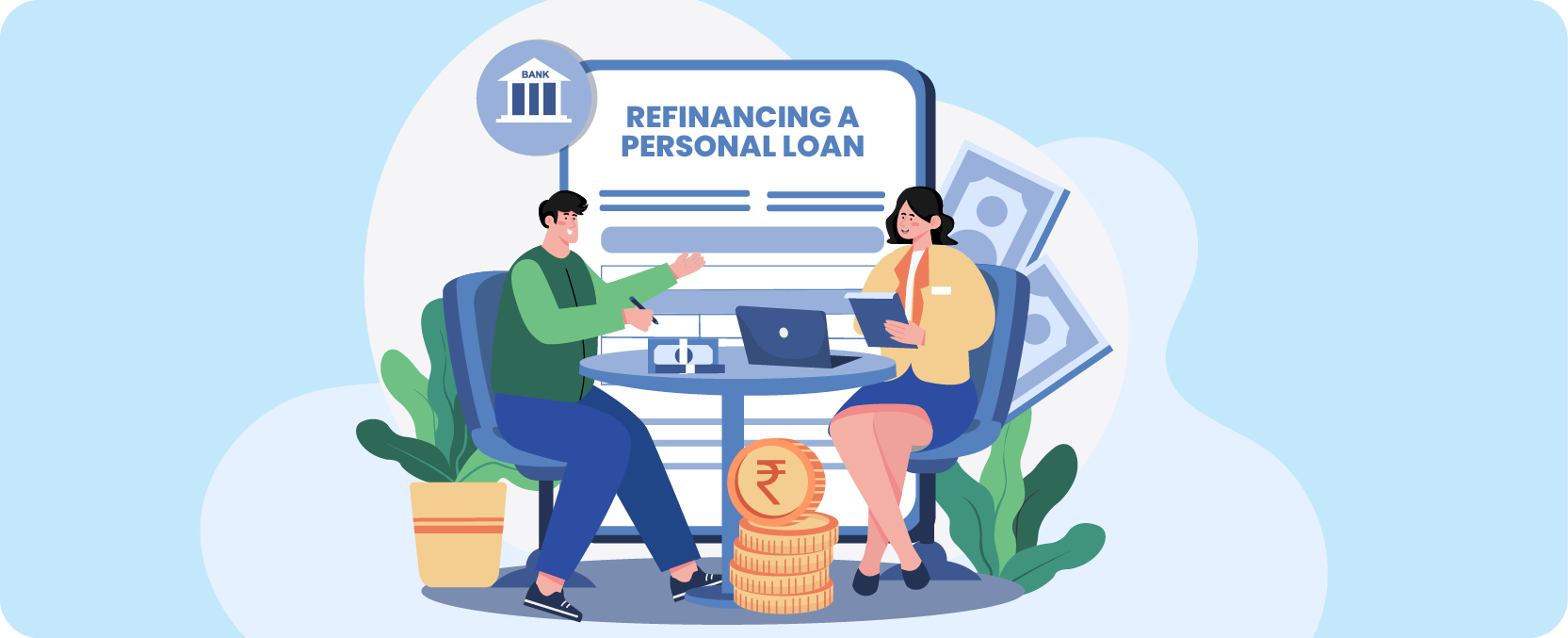- Published on: 20 Oct 2025
- Last updated on: 20 Oct 2025
- Post Views: 1315


Borrowers generally opt for personal loans during emergencies or sudden expenses such as home repairs, festival shopping, or medical needs. In such situations, they often don’t have enough time to research and compare different lenders. Therefore, they may end up choosing the first available option.
However, this can sometimes result in a loan with a higher interest rate. After a few months, borrowers can choose to replace their existing personal loan with another one offering a lower interest rate and better terms. This process is known as personal loan refinancing. In this blog, we’ll know what is the perfect time to opt for a personal loan refinancing.

Refinancing a personal loan means replacing the existing personal loan with a new one to get better loan terms. This new loan can be taken from the same lender (banks & NBFCs) or from a new one. Borrowers can choose a refinanced personal loan to reduce the borrowing cost, the monthly instalment, or to increase the loan tenure. Let’s understand this with an example:
A person named Ramesh has taken a personal loan of ₹1 Lakh at a 24% interest rate for 5 years. After a few months of taking a personal loan, his credit score has improved.
Therefore, he gets an offer of a personal loan from another lender at a 16% interest rate. Ramesh chooses to refinance his existing loan to take advantage of the lower rate and reduce his interest cost.

The question may arise, why does one opt for a refinance personal loan? Here are the main reasons: –
Interest rate benefit is one of the main reasons why borrowers go for personal loan refinancing. A borrower may have opted for a high-interest personal loan during an emergency. Later on, if his/her credit score has improved, lenders may offer a personal loan at a lower interest rate.
Hence, borrowers take advantage of their credit score and go for the refinancing option. This saves their interest cost, resulting in a good amount of savings.
When you opt for refinancing, you get a personal loan at lower interest rates. Due to this, your monthly instalment amount gets decreased. Hence, refinancing reduces your EMI (Equated Monthly Instalment) burden and helps save more money for achieving your financial goals.
A longer loan tenure is also one of the important reasons why borrowers choose to refinance a personal loan. If your existing personal loan has a short tenure, it is likely to come with higher monthly instalments. That can sometimes be difficult to manage.
Therefore, refinancing allows you to extend the loan tenure, resulting in reduced EMIs and making repayment more convenient and manageable.
Refinancing can also help you with debt consolidation (combining all debts into one). Suppose you have multiple personal loans running, which are difficult to manage. You can repay all these loans by taking a single personal loan for the overall consolidated amount.
As a result, you just have to pay one EMI for a single personal loan rather than multiple EMIs for multiple loans.
A new lender offering you a personal loan may provide better terms than your existing lender. These benefits can include reduced processing fees, flexible repayment options, and improved customer service. This is another common reason why borrowers choose to refinance their personal loans.

Here are some scenarios where opting for personal loan refinancing is advisable:
If your credit score has improved after obtaining the first personal loan, you may now qualify for a lower interest rate. In such cases, refinancing can help you replace your existing loan with one that has better terms and reduced borrowing costs.
If your income has increased, either due to a salary increment or other reasons, you may consider refinancing your personal loan. With higher income, you can choose to pay a larger EMI or shorten the loan tenure. This allows you to repay the loan faster and reduce the total interest paid.

Personal loan refinancing offers several benefits, including a lower interest rate, reduced monthly EMI, and a revised loan tenure. Most borrowers choose to refinance primarily to reduce their loan cost, which in turn lowers their EMI. This helps save a significant amount on interest payments.
However, it’s important to be cautious when opting for refinancing, as the costs can sometimes be high due to processing fees or foreclosure charges. Therefore, carefully consider the pros and cons before deciding to refinance your personal loan.
Take control of your finances with DMI Finance’s personal loans. Apply now to enjoy easy terms, lower EMIs, and smarter repayment options!
1. How does refinancing a personal loan work?
When you take a new personal loan to pay off the old one, it is defined as refinancing. The new lender will offer you a loan at a low interest rate and better terms. After assessing your creditworthiness, they will disburse a new loan.
2. Is it worth refinancing a personal loan?
Refinancing a personal loan is a good option if you are getting a new loan at a lower interest rate. It can also reduce your monthly EMI and extend the tenure.
3. Can refinancing a personal loan affect my credit score?
Refinancing a personal loan affects your credit score for a short time as the lender makes a hard inquiry for a new loan. However, as you pay the EMIs on time, your credit score improves.
4. Can I opt for refinancing multiple times?
Yes, you can refinance a loan multiple times if you meet the eligibility criteria.
5. Is refinancing similar to a top-up loan?
Refinancing and top-up loans are quite different. Refinancing means you switch to a new loan with a new lender. A top-up loan, on the other hand, allows you to borrow an additional amount on top of your existing loan without closing it.
6. Can I refinance a personal loan to get more money?
Yes, you can refinance a personal loan for a higher amount. After using part of the new loan to pay off the existing loan, you can access the remaining funds for other financial needs.
7. Do I have to pay closing costs when I refinance the loan?
When you refinance a personal loan, you may have to pay certain closing costs or fees to settle your existing loan. For example, foreclosure charges.
8. Can refinancing reset the loan term?
Yes, refinancing comes with the benefit of a change in the loan terms. It can extend or shorten the loan duration.
9. When refinancing doesn’t make sense?
If the financial benefit from refinancing is less than the refinancing costs, then refinancing is not worth it.
10. Is refinancing a personal loan a good way to increase financial flexibility?
Refinancing might provide you with more control over your monthly budget and repayment plan. This is because it offers improved loan terms, reduced EMIs, or a revised tenure.
| Personal Loan of Different Amounts | ||
| ₹50,000 Personal Loan | ₹1 lakh Personal Loan | ₹2 lakh Personal Loan |
| ₹3 lakh Personal Loan | ₹4 lakh Personal Loan | ₹5 lakh Personal Loan |


